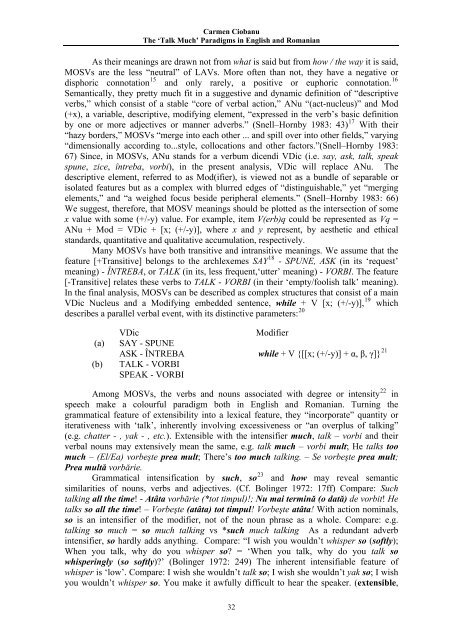translation studies - Facultatea de Litere - Dunarea de Jos
translation studies - Facultatea de Litere - Dunarea de Jos
translation studies - Facultatea de Litere - Dunarea de Jos
Create successful ePaper yourself
Turn your PDF publications into a flip-book with our unique Google optimized e-Paper software.
Carmen Ciobanu<br />
The ‘Talk Much’ Paradigms in English and Romanian<br />
As their meanings are drawn not from what is said but from how / the way it is said,<br />
MOSVs are the less “neutral” of LAVs. More often than not, they have a negative or<br />
disphoric connotation 15 and only rarely, a positive or euphoric connotation. 16<br />
Semantically, they pretty much fit in a suggestive and dynamic <strong>de</strong>finition of “<strong>de</strong>scriptive<br />
verbs,” which consist of a stable “core of verbal action,” ANu “(act-nucleus)” and Mod<br />
(+x), a variable, <strong>de</strong>scriptive, modifying element, “expressed in the verb’s basic <strong>de</strong>finition<br />
by one or more adjectives or manner adverbs.” (Snell–Hornby 1983: 43) 17 With their<br />
“hazy bor<strong>de</strong>rs,” MOSVs “merge into each other ... and spill over into other fields,” varying<br />
“dimensionally according to...style, collocations and other factors.”(Snell–Hornby 1983:<br />
67) Since, in MOSVs, ANu stands for a verbum dicendi VDic (i.e. say, ask, talk, speak<br />
spune, zice, întreba, vorbi), in the present analysis, VDic will replace ANu. The<br />
<strong>de</strong>scriptive element, referred to as Mod(ifier), is viewed not as a bundle of separable or<br />
isolated features but as a complex with blurred edges of “distinguishable,” yet “merging<br />
elements,” and “a weighed focus besi<strong>de</strong> peripheral elements.” (Snell–Hornby 1983: 66)<br />
We suggest, therefore, that MOSV meanings should be plotted as the intersection of some<br />
x value with some (+/-y) value. For example, item V(erb)q could be represented as Vq =<br />
ANu + Mod = VDic + [x; (+/-y)], where x and y represent, by aesthetic and ethical<br />
standards, quantitative and qualitative accumulation, respectively.<br />
Many MOSVs have both transitive and intransitive meanings. We assume that the<br />
feature [+Transitive] belongs to the archlexemes SAY 18 - SPUNE, ASK (in its ‘request’<br />
meaning) - ÎNTREBA, or TALK (in its, less frequent,‘utter’ meaning) - VORBI. The feature<br />
[-Transitive] relates these verbs to TALK - VORBI (in their ‘empty/foolish talk’ meaning).<br />
In the final analysis, MOSVs can be <strong>de</strong>scribed as complex structures that consist of a main<br />
VDic Nucleus and a Modifying embed<strong>de</strong>d sentence, while + V [x; (+/-y)], 19 which<br />
<strong>de</strong>scribes a parallel verbal event, with its distinctive parameters: 20<br />
VDic Modifier<br />
(a) SAY - SPUNE<br />
ASK - ÎNTREBA while + V {[[x; (+/-y)] + α, β, γ]} 21<br />
(b) TALK - VORBI<br />
SPEAK - VORBI<br />
Among MOSVs, the verbs and nouns associated with <strong>de</strong>gree or intensity 22 in<br />
speech make a colourful paradigm both in English and Romanian. Turning the<br />
grammatical feature of extensibility into a lexical feature, they “incorporate” quantity or<br />
iterativeness with ‘talk’, inherently involving excessiveness or “an overplus of talking”<br />
(e.g. chatter - , yak - , etc.). Extensible with the intensifier much, talk – vorbi and their<br />
verbal nouns may extensively mean the same, e.g. talk much – vorbi mult; He talks too<br />
much – (El/Ea) vorbeşte prea mult; There’s too much talking. – Se vorbeşte prea mult;<br />
Prea multă vorbărie.<br />
Grammatical intensification by such, so 23 and how may reveal semantic<br />
similarities of nouns, verbs and adjectives. (Cf. Bolinger 1972: 17ff) Compare: Such<br />
talking all the time! - Atâta vorbărie (*tot timpul)!; Nu mai termină (o dată) <strong>de</strong> vorbit! He<br />
talks so all the time! – Vorbeşte (atâta) tot timpul! Vorbeşte atâta! With action nominals,<br />
so is an intensifier of the modifier, not of the noun phrase as a whole. Compare: e.g.<br />
talking so much = so much talking vs *such much talking As a redundant adverb<br />
intensifier, so hardly adds anything. Compare: “I wish you wouldn’t whisper so (softly);<br />
When you talk, why do you whisper so? = ‘When you talk, why do you talk so<br />
whisperingly (so softly)?’ (Bolinger 1972: 249) The inherent intensifiable feature of<br />
whisper is ‘low’. Compare: I wish she wouldn’t talk so; I wish she wouldn’t yak so; I wish<br />
you wouldn’t whisper so. You make it awfully difficult to hear the speaker. (extensible,<br />
32












